Graduates flying the flag for 'STEMinism'
Students at the University of Bradford organised their first ever alumni networking event to provide insight into life post-university, as a woman in STEM.
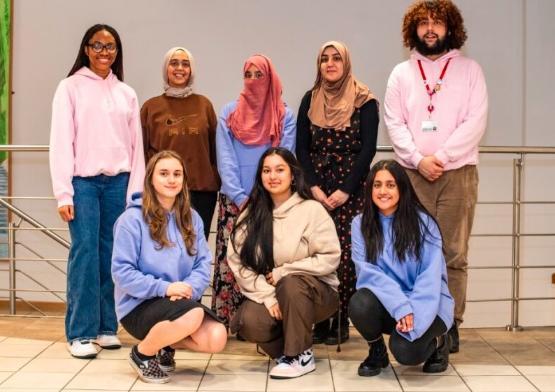
When University of Bradford graduate Stephanie Travers applied for a job with Petronas - F1 partners to Mercedes and Sir Lewis Hamilton - she beat 7,300 other hopefuls to clinch the position.
Fellow graduate Vee Mapunde, who earned her degree in 2003, currently works for the National Institute of Health and Care Research (the funding arm of the NHS) and is a one-woman Dragons’ Den, helping guide health-tech start-ups across what she calls the twin ‘Valleys of Death’.
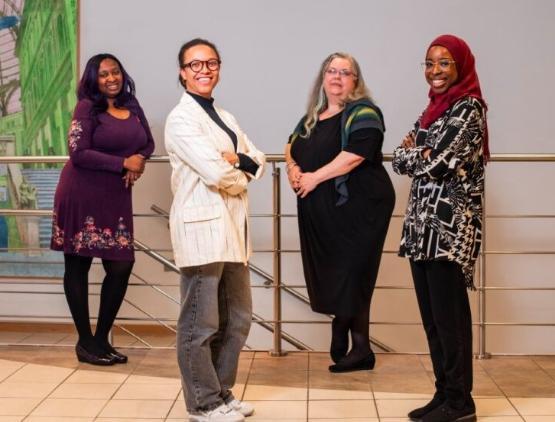
Pictured above fom left: University of Bradford STEM graduates Zainab Garba-Sani, Stephanie Travers, Saskia Lear, Vee Mapunde
Zainab Garba-Sani graduated in 2017 and until recently worked full-time for the NHS and has just completed a fellowship at Stanford University, California, where she set up a project to look at ways of implementing artificial intelligence into healthcare.
Last but certainly not least is Saskia Lear, who graduated in 1997 and is also a guest lecturer and member of the university’s Court. She is principal engineer for JBA Consulting and works on a range of engineering projects for the Environment Agency.
All four are staunch supporters of encouraging more women into STEM (science, technology, engineering and maths) careers, and recently spoke at the STEMinism event, organised by students from the University of Bradford.
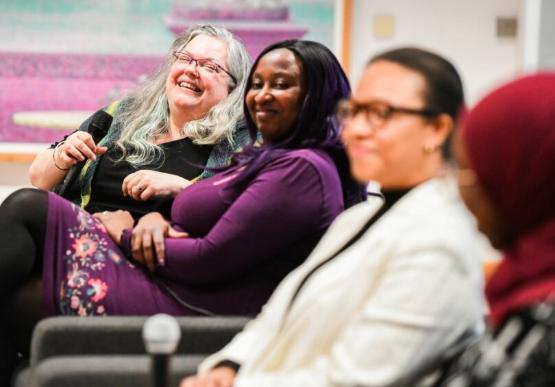
The STEMinism society runs a number of events and activities, including raising money for charity (such as for Victims of Conflict), organising girls' nights out and trips out - a recent careers trip to Manchester attracted an audience of over 30 students across STEM courses.
STEMinism founder and president Alex Troup said: “The idea behind STEMinism was to create a support network for women in STEM subjects, partly because there are so few of us but also to combat any kind of subconscious bias young girls and women may have encountered during their education.
“STEMinism is a society I created with women in similar fields in mind. I wanted to gather us all together, as being in male dominated fields can be isolating.”
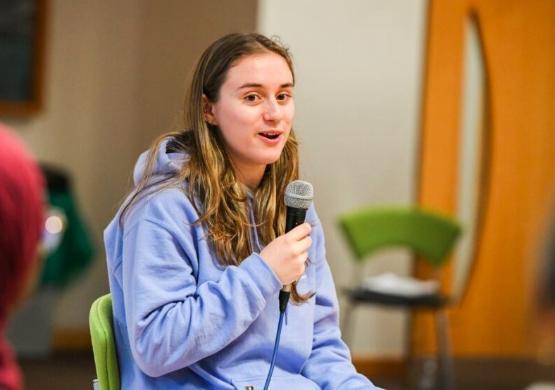
Alex, pictured above, who is on a five-year programme that includes a bachelors in chemical engineering, placement year and masters in chemical engineering, added: “I would like to thank all our guest speakers for their time, for their passion and for supporting STEMinism.”
Stephanie Travers
Stephanie graduated from the University of Bradford with a first in chemical engineering in 2016. She went on to become a trackside fuel engineer for Petronas, working alongside seven-times F1 world champion Sir Lewis Hamilton. She has also worked as deputy team principal at Lewis Hamilton’s Extreme E racing Team X44 and is currently a senior development officer at his charity Mission44, which aims to empower young people from under-served communities.
She said: “I am really impressed with the STEMinism society. There was nothing like this when I was at university. I think it's so important for us to have that collaboration, an environment where we are able to network and empower each other, and to inspire the next generation coming to university. Having something like this that showcases roles you may not know about is so powerful, so I hope it continues to grow as a society.”
She added: “The University of Bradford gave me the grounding I needed to forge a career in chemical engineering. I had always wanted to work in F1 and the placement year I did while at university also helped me get into F1.”
Vee Mapunde
Vee graduated in 2003 and now works for the NIHR and now helps shepherd health-tech start-ups across the treacherous business landscape. She also praised the STEMinism event.
She said: “It’s important because I come from a time when options were limited. There are many people who have skills but often don’t believe they can do the job because they don’t fit a certain mould or they think something is really difficult.
“There is also lots of tech that introduces bias into the healthcare system, a good example being oximeters [which measure oxygen content in the blood], which are more accurate when used on lighter skin tones. Artificial intelligence is another example, because it relies on data, so we need to ensure that is representative of the population, otherwise we are already condemning people to poor outcomes.
“It’s about raising awareness and that is also why it's important to have a diverse workforce. We need women and people who can give different perspectives.”
She added: “When most people think of engineering, they think of building bridges but engineering is everywhere. In my job, I help people who have business start-up ideas to get funding so they can cross what we call the ‘valleys of death’, which is where start-ups often falter.”
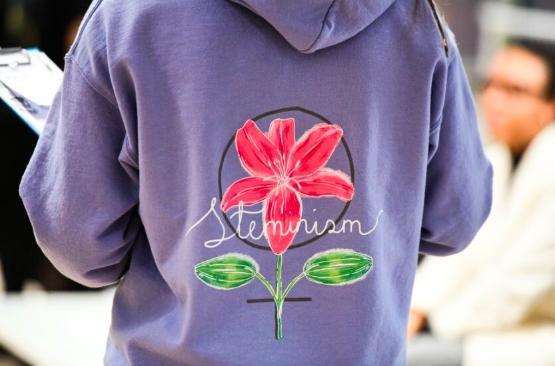
Zainab Garba-Sani
Zainab is a former sabbatical officer who graduated in 2017 and went on to work for the NHS in the field of health policy. She is currently leading a programme which has won funding from the likes of Google and Samsung, to pioneer new ways of introducing AI into healthcare.
She said: “Bradford helped me find a career in STEM, so if I can open doors and inspire other people, I am more than happy to do that through events like this.
“Looking back at my time as a sabbatical officer, that introduced me to the world of policy and that led me into the NHS and healthcare.”
Saskia Lear
Saskia is principal designer for JBA Consulting and largely works on projects for the Environment Agency. She is a regular visitor to her alma mater, delivering guest lectures and being an active member of Court, the university’s overarching governing body. She has fond memories of her time at Bradford.
“I came to this university as an EU national. I was technically from Germany but had started studying in South Africa because that’s where my parents were at the time, so I was far away from family and friends and any kind of support. The way I was treated here by other students, teachers, lecturers, the general public, made me feel so at home that 27 years on I am still living in Bradford. I love it so much.”
She added: “It was important to me to give something back. As a female engineer, I am always looking to be able to recruit more females into engineering. In my profession that means telling them what to expect, and also what not to expect. I fully support this event.”
